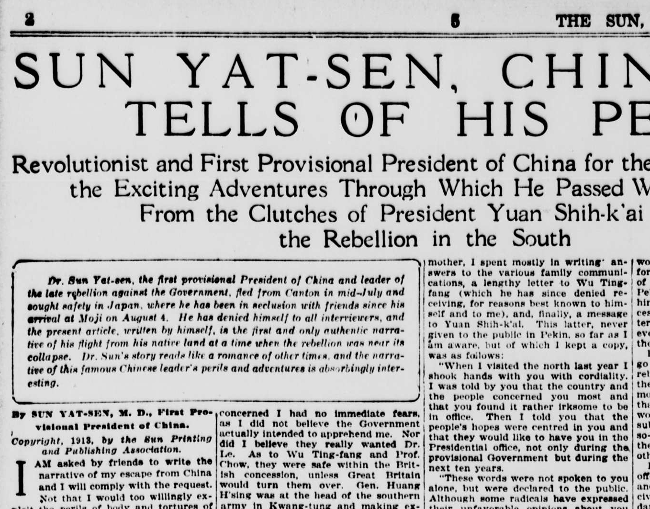Xi’s Worst Enemy
As Xi Jinping moves toward a third term in power, the thing to remember is Sun Yat-sen’s vision for Chinese democracy.

President Xi’s impending third term is a moment to mark the prospects for China’s democracy. Mr. Xi will no doubt see a third term as vindicating his vision of tyranny as the path to “national rejuvenation” — and a rebuke to Western-style democracy that he sees as “catastrophic.” The thing to remember is that there was a time of ferment, after the fall of the Manchu dynasty, when there was a Chinese vision of democracy on offer from Sun Yat-sen.
Sun was born in China and lived for a time in America. He was a patriot of his native land and troubled by China’s humiliation by the West in the late 19th and early 20th century. He saw the misrule of the Manchus as the problem. Inspired by the American Revolution, Sun viewed a constitutional democracy as the solution for his own country. When the Manchus collapsed, he became the first head of the Republic of China.
Even as the West inspired Sun, he inspired the West. “The most conservative nation in existence has amazed the world by a revolution and the establishment, for a while at least, of a republic,” The New York Sun wrote in 1912 in an editorial noting how “it seems clear that autocracy and the policy of seclusion are at an end in China and that representative government in some form will take its place.”
The wish no doubt fathered that thought. After 2,000 years of rule by emperors, the prospects for self-government in China were even less obvious than they are today. “The fundamental requisites for democracy,” historian C.P. Fitzgerald wrote, were “lacking.” Yet Sun anticipated “a constitutional government with universal suffrage, free elections, and separation of powers,” as China scholar John Thornton explains.
Later in 1912, The New York Sun followed up on the early prospects of the new republic, interviewing an American who worked as a Chinese customs official, Francis A. Carl. The “downright good hard common sense of the Chinese people, their essential democracy and above all their tremendous power for dogged, unflagging tenacity in what they believe,” Carl said, “will go far to assure the success of the republic.”
Carl’s optimism, like Sun’s, was not borne out by events. The first steps of the Chinese toward democracy were plagued by corruption and undermined by the remnants of the old imperial regime, as well as foreign interference. As China slipped back toward tyranny, the republican government entered into negotiations. After little more than a year of democratic rule, Sun Yat-sen was, in a tragic turn of events, forced to flee the country.
Then came civil war, won eventually by the communists. Sun Yat-sen died in 1925, but the communists still celebrate him for toppling the emperors. In any event, Sun’s Republic of China itself fled to the island of Taiwan, where the seeds of democracy were nurtured and eventually blossomed. Mainland China has remained under communist despotism, despite a reopening to the West and a friendlier attitude toward capitalism.
In 1989, a brief flowering of democratic activism was crushed at Tiananmen Square. Even then, hopes flickered, encouraged, say, by remarks like those of Premier Wen Jibao. “When we talk about democracy,” Mr. Wen said in 2006, “we usually refer to three key components: elections, judicial independence, and supervision based on checks and balances.” Yet even the thought of such tentative steps to freedom has been stifled under Mr. Xi.
As for Sun Yat-sen, in 1913, writing from exile for The New York Sun, he decried the “despotism that has throttled the real Republic of China.” Wrote he: “I wish to state in this place, though disclaiming the use of vain or boastful words, that the end is not yet” and “one of these days” the “tyrant of Pekin will hurry from the country quite as ignominiously as ever a culprit left his former haunts.”
True democrats grasp that Mr. Xi will eventually be forced to reckon with the concept of the consent of the governed. Sneering at time-tested definitions of democracy, his aides seek to replace them with the idea of “substantive democracy,” meaning, like the way America’s left views our 14th Amendment, that democracy can mean anything. The name of Xi will be long forgotten during the centuries in which Sun Yat-sen will be remembered.


